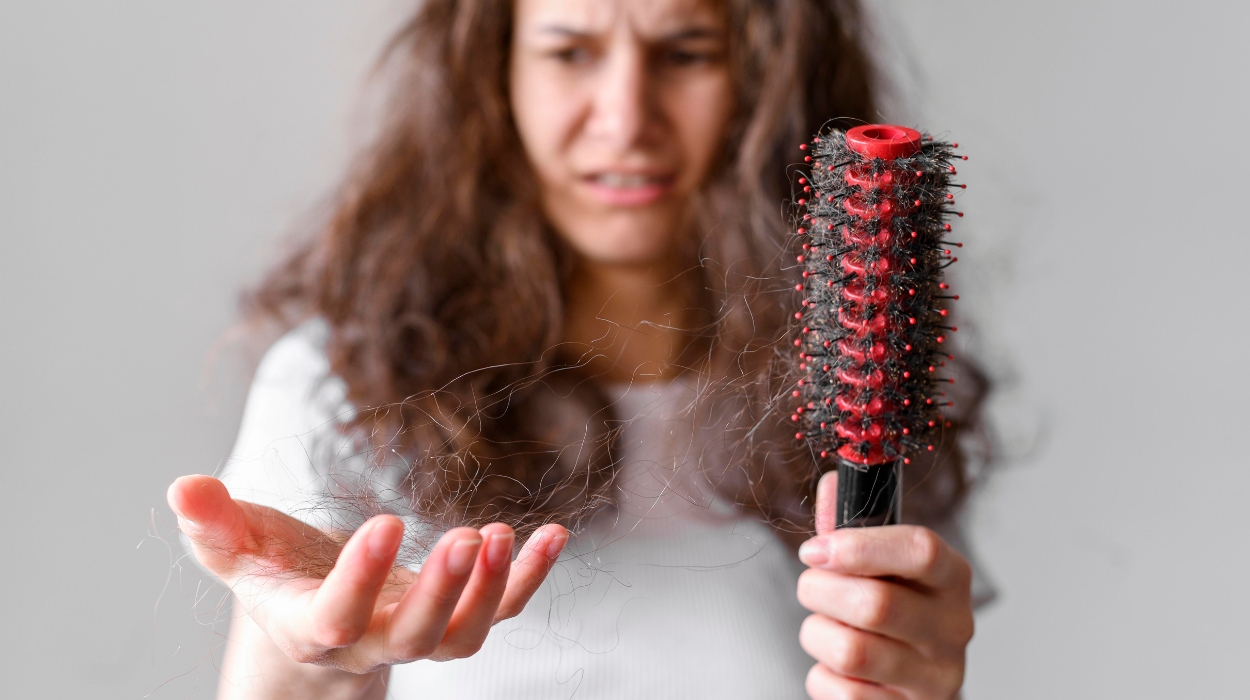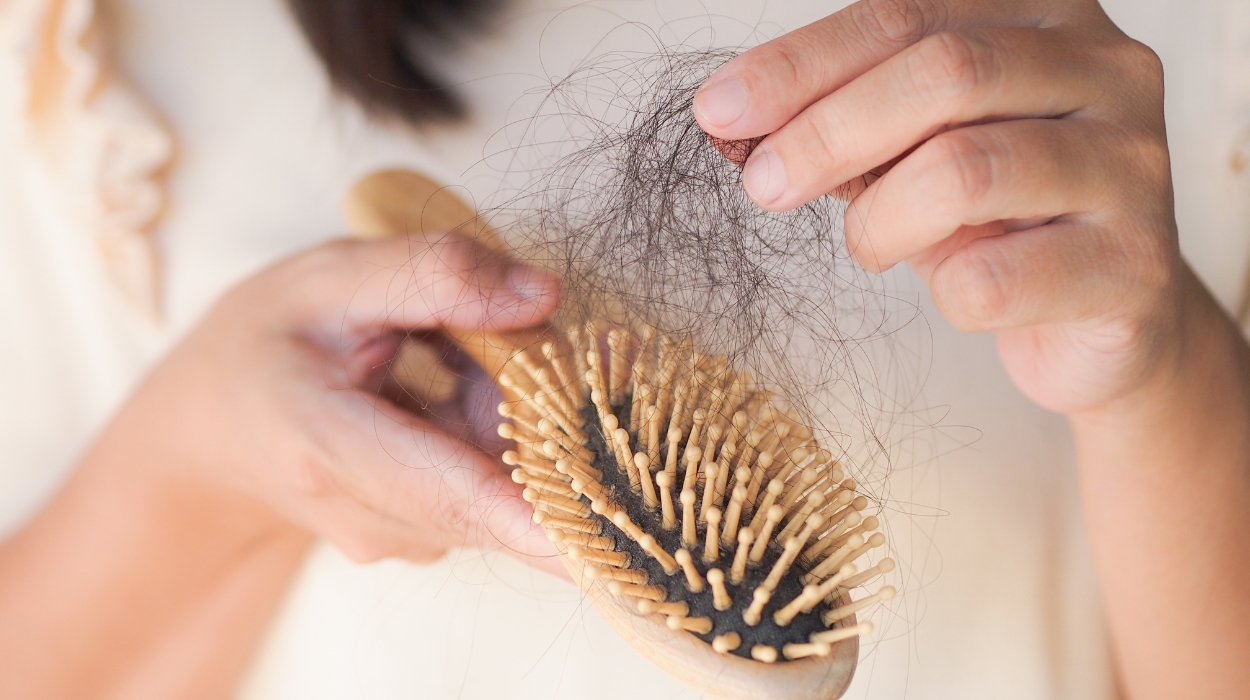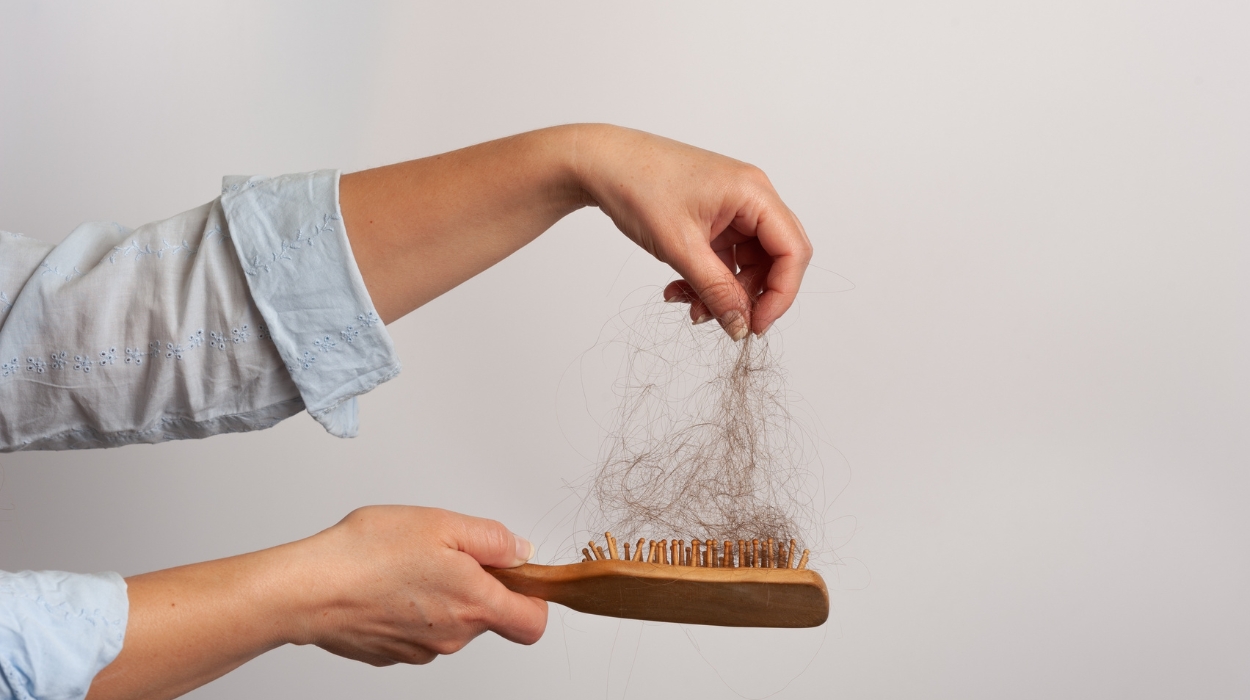 Expert's opinion
Expert's opinion
Expert's opinion
The article is a subjective view on this topic written by writers specializing in medical writing.
It may reflect on a personal journey surrounding struggles with an illness or medical condition, involve product comparisons, diet considerations, or other health-related opinions.
Although the view is entirely that of the writer, it is based on academic experiences and scientific research they have conducted; it is fact-checked by a team of degreed medical experts, and validated by sources attached to the article.
The numbers in parenthesis (1,2,3) will take you to clickable links to related scientific papers.
Weight Loss And Hair Loss: What Happens And How To Treat 2024

If you’ve recently experienced dramatic or rapid weight loss and you’re losing hair, that’s because of the special link between weight loss and hair loss. Hair loss due to weight loss is typically temporary, and regrowth should occur once your weight stabilizes. However, it’s still essential to identify any potential medical conditions related to hair loss.
Many nutrients affect hair growth, and certain nutrient deficiencies can cause you to lose hair. In addition to following a balanced diet, some other tactics may improve your hair health and keep your locks strong. These include stress management and gentle hair care.
Can Weight Loss Cause Hair Loss?
Yes, significant or sudden weight loss can lead to increased hair shedding and noticeable thinning. If you’re trying to lose weight, experts generally recommend aiming for a loss of 1-2 pounds per week.[1]
Losing weight gradually on a balanced diet may prevent you from losing hair. More rapid weight loss can sometimes cause a type of diffuse hair loss known as telogen effluvium.
Why Does Weight Loss Cause Hair Loss?

Telogen effluvium causes a shortening of the active growth, or anagen, phase of the hair cycle, with more hairs moving to the resting, or telogen,[2] phase. This causes increased shedding,[3] leading to overall hair thinning.
It’s normal to lose 50 to 100 strands of hair daily, while more than that can indicate excessive shedding. Telogen effluvium can cause shedding[3] of about 300 to over 1,000 strands per day, a significant increase from the norm.
This increased shedding generally occurs about 3-4 months[3] after a trigger such as a significant weight loss and can last for 3-6 months.
Other common causes include psychological stress, childbirth, hormone changes, illness (especially with fever), or surgeries.
Bariatric surgery, weight loss surgery for obesity, often triggers excessive hair shedding within 3-6 months after the procedure.[4]
A nutrient deficiency[4] may be to blame if the shedding continues after this. Severely restricted or crash diets can also lead to nutrient deficiencies.
Hair Loss And Nutrient Deficiencies
After losing weight, hair loss may occur due to inadequate nutrition. An inadequate[5] calorie intake can lead to hair falling out and thinning, as can a nutrient deficiency.
Optimal intake of protein and multiple vitamins and minerals is critical to hair health.
Protein
The hair shaft is composed mainly of protein, and the hair follicles need adequate protein and energy for cell division and hair shaft production.[6]
One study in India, where inadequate protein intake[7] is more common, identified low levels of various amino acids[8] in hair loss patients.
While protein deficiency is rare in developed countries, if you’re following a reduced-calorie diet, it’s critical to ensure you’re getting enough protein to preserve lean tissue as well as hair health.
Minerals
Some studies have found a link between low levels of iron[9] and hair loss disorders. Losing hair is a symptom of iron deficiency,[10] and iron deficiency anemia is a commonly identified cause[11] of telegon effluvium. It’s thought that low iron availability impairs the follicles’ hair production.
Common causes[12] of iron deficiency include menstrual blood loss (in premenopausal women), pregnancy, and diets low in iron.
Following a vegetarian or vegan diet can lead to iron deficiency because iron in plant foods is less bioavailable than iron in animal products. Good plant-based sources of iron include beans, lentils, and dark green leafy vegetables.
Consuming foods high in vitamin C along with iron sources increases iron absorption[13] and thus may indirectly promote hair growth. Adequate intake of the amino acid L-lysine may also benefit iron absorption.
Research has found that adding L-lysine to iron supplementation increased levels of ferritin, an iron-binding protein that reflects iron stores.
Deficiencies of other minerals are also linked with hair loss, including selenium and zinc. Selenium deficiencies are more common in certain medical conditions and in countries with low soil selenium levels.
There is limited research on selenium deficiency and supplementation for hair loss, however, and too much selenium can cause toxicity and lead to losing hair.
Zinc deficiency[14] is more common in vegetarians, particularly vegans, during pregnancy, or in people with certain gastrointestinal disorders.
Research has found that zinc supplementation reverses hair loss in cases of telogen effluvium with zinc deficiency. However, supplementation may not help if there’s no deficiency present, and toxicity can occur with excess supplementation.
Vitamins
Some vitamins are also linked with hair loss, including vitamin D, vitamin B12, and the B vitamins biotin, niacin, and riboflavin. Fortunately, because of fortification, deficiencies of niacin and riboflavin[12] are rare in developed countries.
Biotin deficiency is also rare in healthy people since the body’s gut bacteria produce biotin. It’s also abundant in high-protein foods such as eggs, meat, fish, nuts, and seeds.
Biotin deficiency is more prevalent[15] during pregnancy and in people who take anticonvulsant medications, have abnormal gut flora after antibiotic use, or have health conditions[16] such as gastrointestinal disorders or alcohol abuse.
Though research has found that biotin supplements improve hair loss associated with deficiency, there’s a lack of research on biotin supplement use in individuals experiencing hair loss without a deficiency. Though there’s no evidence of toxicity with biotin supplementation, a high intake can interfere with lab test results.
Vitamin D[17] has a role in the cycling of hair. Some studies have found lower vitamin D levels in women with hair loss, but research is limited.
Vitamin D deficiency is more common in individuals with darker skin, those with limited sun exposure, and those who avoid dairy due to allergy, intolerance, or a vegan diet.
In one study[18] of women with telogen effluvium, supplementing with the amino acid l-cysteine, medicinal yeast (also known as Brewer’s yeast) containing B-complex and the B vitamin pantothenic acid improved their hair regrowth significantly within six months.
Is Hair Loss Dangerous?
Although hair loss is common, it can be very distressing and has been linked with anxiety and depression. The type of hair loss caused by weight loss, telogen effluvium, is generally temporary and lasts less than six months.
However, in some cases, telogen effluvium continues for a more extended period and is considered chronic. Diffuse (all over) hair loss can also have other causes, including female pattern hair loss, also known as androgenetic alopecia. Androgenetic alopecia has a genetic link and may be treated with medications.
Sometimes hair loss is accompanied by pain in the scalp, termed trichodynia.[19] This scalp pain is prevalent[20] with telegony effluvium but also occurs in other hair loss disorders like female pattern hair loss.
The cause of trichodynia[20] is not well understood, but it’s been linked to mental health problems such as anxiety and depression. A dermatologist may recommend various oral or topical treatments if symptoms are bothersome.
If you’re concerned about hair loss, it’s best to consult a health professional such as a dermatologist to determine the cause and potential treatment options. Various health conditions can lead to hair loss, including thyroid, and immune or gastrointestinal conditions.
Additionally, some medications or treatments, such as chemotherapy or radiation, can cause hair loss. Using harsh hair products or wearing hairstyles that pull on the hair can also cause hair loss.
An ongoing cause for hair loss, such as crash dieting or an eating disorder leading to nutrient deficiencies should be addressed. A restrictive diet due to allergies or intolerances, food dislikes, or ethical beliefs can also contribute to a nutrient deficiency.
How To Stop Hair Loss After Weight Loss?

Losing hair can be very upsetting, and you may be wondering how to stop hair loss due to weight loss. Most hair loss resulting from weight loss is temporary. It’s typical to see hair growth 3-6 months after the cause, such as weight loss, has been resolved.
However, there may be steps you can take to take to optimize your hair health and prevent further losses.
Stress Management
Since emotional stress has been linked with losing hair, managing stress levels through therapy and other methods such as meditation, yoga, or other calming exercises may be beneficial.
Gentle Hair Care
Experts[21] recommend handling hair carefully and washing it with a gentle shampoo while going through hair loss. Avoid] hairstyles that pull on the hair to prevent damage or further losses. Limit brushing and use of flat irons, blow dryers, and harsh styling products.
Good Nutrition
It’s critical to ensure you follow a healthy diet with adequate calories and essential nutrients. Iron deficiency is a common cause of hair loss, particularly in premenopausal women. Ferritin levels lower than 50-70 micrograms per liter may indicate less than optimal iron storage, according to researchers.
Medical Advice
Consult your healthcare provider about testing for any potential medical conditions or nutrient deficiencies contributing to your hair loss. You should also talk to your healthcare provider before supplementing nutrients.
Some nutrients can lead to toxicity when taken in excess and can actually cause hair loss. These include selenium, vitamin A, and vitamin E.
Summary
If you’re experiencing hair loss after a recent significant weight loss, it often is temporary. However, it’s still essential to address any potential medical causes and any nutrient deficiencies contributing to your hair loss.
Following a balanced diet, managing stress levels, and gentle hair care may all play a role in restoring hair health.
+ 21 sources
Health Canal avoids using tertiary references. We have strict sourcing guidelines and rely on peer-reviewed studies, academic researches from medical associations and institutions. To ensure the accuracy of articles in Health Canal, you can read more about the editorial process here
- CDC (2023). Losing Weight . [online] Centers for Disease Control and Prevention. Available at: https://www.cdc.gov/healthyweight/losing_weight/index.html.
- Hoover, E., Alhajj, M. and Flores, J.L. (2023). Physiology, Hair. [online] Nih.gov. Available at: https://www.ncbi.nlm.nih.gov/books/NBK499948/.
- Rebora, A. (2019). Telogen effluvium: a comprehensive review. Clinical, Cosmetic and Investigational Dermatology, [online] Volume 12, pp.583–590. doi:https://doi.org/10.2147/ccid.s200471.
- Cohen-Kurzrock, R.A. and Cohen, P.R. (2021). Bariatric Surgery-Induced Telogen Effluvium (Bar SITE): Case Report and a Review of Hair Loss Following Weight Loss Surgery. Cureus. [online] doi:https://doi.org/10.7759/cureus.14617.
- Goldberg, L.J. and Lenzy, Y. (2010). Nutrition and hair. Clinics in Dermatology, [online] 28(4), pp.412–419. doi:https://doi.org/10.1016/j.clindermatol.2010.03.038.
- Trueb, R.M. (2021). ‘Let food be thy medicine’: Value of nutritional treatment for hair loss. International Journal of Trichology, [online] 13(6), pp.1–1. doi:https://doi.org/10.4103/ijt.ijt_124_20.
- Suri, S. (2020). India’s protein deficiency and the need to address the problem. [online] ResearchGate. Available at: https://www.researchgate.net/publication/347523282_India’s_protein_deficiency_and_the_need_to_address_the_problem.
- Gowda, D., V Premalatha and Imtiyaz, D.B. (2017). Prevalence of nutritional deficiencies in hair loss among Indian participants: Results of a cross-sectional study. International Journal of Trichology, [online] 9(3), pp.101–101. doi:https://doi.org/10.4103/ijt.ijt_48_16.
- Guo, E.L. and Katta, R. (2017). Diet and hair loss: effects of nutrient deficiency and supplement use. Dermatology practical & conceptual, [online] pp.1–10. doi:https://doi.org/10.5826/dpc.0701a01.
- Ruiz-Tagle, S.A., Figueira, M.M., Verónica Vial-Letelier and Maria, M. (2018). Micronutrients in hair loss. [online] ResearchGate. Available at: https://www.researchgate.net/publication/326180006_Micronutrients_in_hair_loss.
- Shashikant Malkud (2015). A Hospital-based Study to Determine Causes of Diffuse Hair Loss in Women. Journal of Clinical and Diagnostic Research. [online] doi:https://doi.org/10.7860/jcdr/2015/14089.6170.
- Almohanna, H.M., Ahmed, A.A., Tsatalis, J.P. and Tosti, A. (2018). The Role of Vitamins and Minerals in Hair Loss: A Review. Dermatology and Therapy, [online] 9(1), pp.51–70. doi:https://doi.org/10.1007/s13555-018-0278-6.
- Abbaspour, N., Hurrell, R. and Kelishadi, R. (2014). Review on iron and its importance for human health. Journal of research in medical sciences : the official journal of Isfahan University of Medical Sciences, [online] 19(2), pp.164–74. Available at: https://www.ncbi.nlm.nih.gov/pmc/articles/PMC3999603/.
- Nih.gov. (2016). Office of Dietary Supplements – Zinc. [online] Available at: https://ods.od.nih.gov/factsheets/Zinc-HealthProfessional/.
- Nih.gov. (2020). Office of Dietary Supplements – Biotin. [online] Available at: https://ods.od.nih.gov/factsheets/Biotin-HealthProfessional/.
- Patel, D.P., Swink, S.M. and Castelo-Soccio, L. (2017). A Review of the Use of Biotin for Hair Loss. Skin appendage disorders, [online] 3(3), pp.166–169. doi:https://doi.org/10.1159/000462981.
- Nih.gov. (2015). Office of Dietary Supplements – Vitamin D. [online] Available at: https://ods.od.nih.gov/factsheets/vitamind-healthprofessional/.
- Lengg, N., Heidecker, B., Seifert, B. and Trüeb, R.M. (2007). Dietary supplement increases anagen hair rate in women with telogen effluvium: Results of a double-blind,… [online] ResearchGate. Available at: https://www.researchgate.net/publication/244933760_Dietary_supplement_increases_anagen_hair_rate_in_women_with_telogen_effluvium_Results_of_a_double-blind_placebo-controlled_trial.
- Trüeb, R.M., Starace, M.V.R., Bianca Maria Piraccini, Hudson Dutra Rezende and Fernanda, M. (2021). Trichodynia Revisited. Skin appendage disorders, [online] 7(6), pp.449–453. doi:https://doi.org/10.1159/000517463.
- Mohammed Abu El-Hamd and Soha Aboeldahab (2022). Trichodynia: An Update on Definition, Etiopathogenesis, Diagnosis, and Treatment. [online] ResearchGate. Available at: https://www.researchgate.net/publication/358231050_Trichodynia_An_Update_on_Definition_Etiopathogenesis_Diagnosis_and_Treatment.
- Mysore, V., Anchala Parthasaradhi, RD Kharkar, Ghoshal, A., Anil Ganjoo, Ravichandran, G., Abir Saraswat, Shah, Y., Singh, M., TJ Remadevi and Matte, P. (2019). Expert consensus on the management of telogen effluvium in India. International Journal of Trichology, [online] 11(3), pp.107–107. doi:https://doi.org/10.4103/ijt.ijt_23_19.



